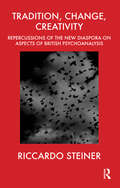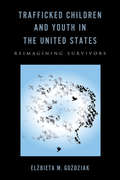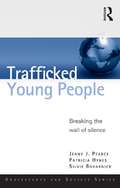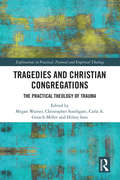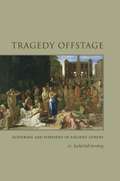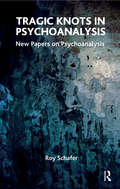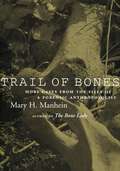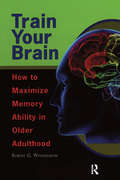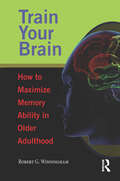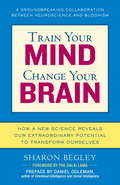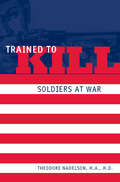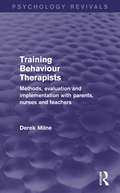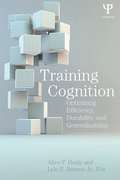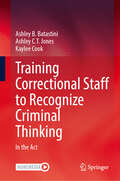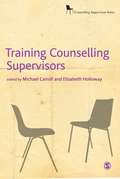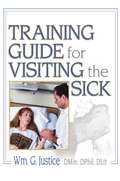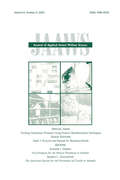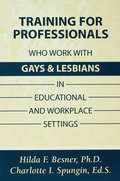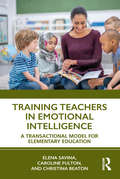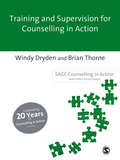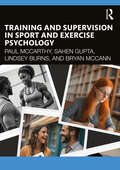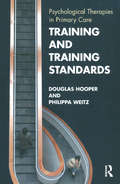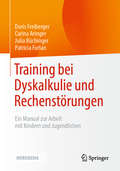- Table View
- List View
Tradition, Change, Creativity: Repercussions of the New Diaspora on aspects of British Psychoanalysis
by Riccardo SteinerA companion volume to It is a New Kind of Diaspora. Taking up where that book leaves off, it traces some of the consequences of the emigration of German and Austrian psychoanalysts to London, particularly in the context of the British Psycho-Analytical Society's "Controversial Discussions". The first part of the book, "Tradition and Change" traces some general issues related to the Discussions, in particular drawing on documentary sources from the Archives of the British Psycho-Analytical Society. The second part focuses on one crucial issue in the Discussions - the differing interpretations formulated about the psychic life of babies during the first six months of life. Throughout this section, and the rest of the book, the author constantly stresses the larger social and political contexts within which psychoanalysis exists. The last part examines the legacy of the Discussions in the work of one of the most distinguished Kleinian analysts, Hanna Segal, and in particular her work on creativity and aesthetics.
Trafficked Children and Youth in the United States: Reimagining Survivors
by Elzbieta M. GozdziakTrafficked children are portrayed by the media--and even by child welfare specialists--as hapless victims who are forced to migrate from a poor country to the United States, where they serve as sex slaves. But as Elzbieta M. Gozdziak reveals in Trafficked Children in the United States, the picture is far more complex. Basing her observations on research with 140 children, most of them girls, from countries all over the globe, Gozdziak debunks many myths and uncovers the realities of the captivity, rescue, and rehabilitation of trafficked children. She shows, for instance, that none of the girls and boys portrayed in this book were kidnapped or physically forced to accompany their traffickers. In many instances, parents, or smugglers paid by family members, brought the girls to the U.S. Without exception, the girls and boys in this study believed they were coming to the States to find employment and in some cases educational opportunities. Following them from the time they were trafficked to their years as young adults, Gozdziak gives the children a voice so they can offer their own perspective on rebuilding their lives--getting jobs, learning English, developing friendships, and finding love. Gozdziak looks too at how the children's perspectives compare to the ideas of child welfare programs, noting that the children focus on survival techniques while the institutions focus, not helpfully, on vulnerability and pathology. Gozdziak concludes that the services provided by institutions are in effect a one-size-fits-all, trauma-based model, one that ignores the diversity of experience among trafficked children. Breaking new ground, Trafficked Children in the United States offers a fresh take on what matters most to these young people as they rebuild their lives in America.
Trafficked Young People: Breaking the Wall of Silence (Adolescence and Society)
by Jenny Pearce Patricia Hynes Silvie BovarnickHuman trafficking constitutes one of the most serious human rights violations of our time. However, many social work practitioners still have a poor and incomplete understanding of the experiences of children and young people who have been trafficked. In Trafficked Young People, the authors call for a more sophisticated, informed and better developed understanding of the range of issues facing trafficked young people. In the first work of its kind to combine an up-to-date overview of the current policy context with related theoretical concerns and practitioner experiences, Pearce, Hynes & Bovarnick demonstrate how the trafficking of children and young people should be regarded as a child protection, rather than an immigration concern. Drawing on focus group and interview research with 72 practitioners and covering the cases of 37 individuals, Trafficked Young People explores the way child care practitioners identify, understand and work with the problems faced by people who have been trafficked. The book looks at how practitioners interpret and use definitions of trafficking in their day to day work; at their experiences of exposing the needs of trafficked children and young people and at their efforts to find appropriate resources to meet these needs. Trafficked Young People will be of interest to practitioners working in support housing and social work, along with solicitors and sociologists, particularly those working within discourses of child agency, self determination and victimhood. With its emphasis on the legal and policy framework, and integrated throughout with case histories, practitioner interviews and recommendations for best practice, Trafficked Young People is essential reading for anyone working within a Social Policy Development context.
Tragedies and Christian Congregations: The Practical Theology of Trauma (Explorations in Practical, Pastoral and Empirical Theology)
by Christopher Southgate Megan Warner Carla A. Grosch-Miller Hilary IsonWhen tragedy strikes a community, it is often unexpected with long-lasting effects on the people left in its wake. Too often, there aren’t adequate systems in place to aid those affected in processing what has happened. This study uniquely combines practical theology, pastoral insight and scientific data to demonstrate how Christian congregations can be helped to be resilient in the face of sudden devastating events. Beginning by identifying the characteristics of trauma in individuals and communities, this collection of essays from practitioners and academics locates sudden trauma-inducing tragedies as a problem in practical theology. A range of biblical and theological responses are presented, but contemporary scientific understanding is also included in order to challenge and stretch some of these traditional theological resources. The pastoral section of the book examines the ethics of response to tragedy, locating the role of the minister in relation to other helping agencies and exploring the all-too-topical issue of ministerial abuse. Developing a nuanced rationale for good practical, pastoral, liturgical and theological responses to major traumas, this book will be of significant value to scholars of practical theology as well as practitioners counselling in and around church congregations.
Tragedy Offstage: Suffering and Sympathy in Ancient Athens
by Rachel Hall SternbergHumane ideals were central to the image Athenians had of themselves and their city during the classical period. Tragic plays, which formed a part of civic education, often promoted pity and compassion. But it is less clear to what extent Athenians embraced such ideals in daily life. How were they expected to respond, emotionally and pragmatically, to the suffering of other people? Under what circumstances? At what risk to themselves?
Tragedy and Theory: The Problem of Conflict Since Aristotle
by Michelle GellrichThis book intends to explain how seminal ideas in accounts of tragedy are expressions of systematically determined interests, typically latent in dramatic theory, but intelligible once a fuller view of a theorist's corpus is adopted.
Tragic Knots in Psychoanalysis: New Papers on Psychoanalysis
by Roy SchaferThis is a collection of published and unpublished papers on clinical, theoretical and applied aspects of psychoanalysis that take up various aspects of unconscious mental processes and conflicts and their expression in the clinical transference and countertransference. These expressions are evidenced in frustration, gratitude and benevolence, competing feelings of being cared for and coerced, disturbed and expanded bodily pleasure, cruelty and forgiveness. Included in this book is a brief history of the author's odyssey through several major contributions regarding the language of psychoanalysis and its narrativity, and the convergence of these with contemporary Kleinian modes of thought.
Trail of Bones: More Cases from the Files of a Forensic Anthropologist
by Mary H. ManheinA fellow of the American Academy of Forensic Sciences and an expert on the human skeleton, Mary H. Manhein assists law enforcement officials across the country in identifying bodies and solving criminal cases. In Trail of Bones, her much-anticipated sequel to The Bone Lady, Manhein reveals the everyday realities of forensic anthropology. Going beyond the stereotypes portrayed on television, this real-life crime scene investigator unveils a gritty, exhausting, exacting, alternately rewarding and frustrating world where teamwork supersedes individual heroics and some cases unfortunately remain unsolved. A natural storyteller, Manhein provides gripping accounts of dozens of cases from her twenty-four-year career. Some of them are famous. She describes her involvement in the hunt for two serial killers who simultaneously terrorized the Baton Rouge, Louisiana, region for years; her efforts to recover the remains of the seven astronauts killed in the Columbia space shuttle crash in 2003; and her ultimately successful struggle to identify the beheaded toddler known for years as Precious Doe. Less well-known but equally compelling are cases involving the remains of a Korean War soldier buried for more than forty years and the mystery of “Mardi Gras Man,” who was wearing a string of plastic beads when his body was discovered. Manhein describes how the increased popularity of tattoos has aided her work and how forensic science has labored to expose frauds—including a fake “big foot” track she examined from Louisiana's Kisatchie National Forest. She also shares ambitious plans to create a database of biological and DNA profiles of all of the state's missing and unidentified persons. Possessing both compassion and tenacity, Mary Manhein has an extraordinary gift for telling a life story through bones. Trail of Bones takes readers on an entertaining and educating walk in the shoes of this remarkable scientist who has dedicated her life to providing justice for those no longer able to speak for themselves.
Train Your Brain: How to Maximize Memory Ability in Older Adulthood
by Robert G WinninghamTrain Your Brain was written to provide older adults, and the people who work with them, with practical and scientifically based suggestions and interventions on how to maintain and even improve memory ability. Researchers have found that certain lifestyle factors predict the likelihood of developing memory problems. Most chapters begin with research summaries, followed by practical suggestions for taking advantage of the identified factors that affect memory. The book also contains information and suggestions for people interested in starting a cognitive enhancement program in an assisted living facility, senior center, or medical setting. Two chapters, "How Memory Works" and "How the Brain Works," provide readers with a foundation of knowledge so they can get the most out of subsequent chapters. The author presents the "Use It or Lose It" theory of memory and aging and the overwhelming evidence that cognitive stimulation is associated with better memory ability; he also provides information on how nutrition, physical exercise, mood, stress, and sleep all affect memory. The book contains cognitive enhancement activities, with instructions, that can be used to create a memory enhancement program for oneself or others. However, even all of this information won't help the older adult who is unmotivated to make the necessary behavioral changes, so the author includes information on how to motivate people to do the things that can improve their quality of life and their ability to make new memories.
Train Your Brain: How to Maximize Memory Ability in Older Adulthood
by Robert G. Winningham"Train Your Brain" was written to provide older adults, and the people who work with them, with practical and scientifically based suggestions and interventions on how to maintain and even improve memory ability. Researchers have found that certain lifestyle factors predict the likelihood of developing memory problems. Most chapters begin with research summaries, followed by practical suggestions for taking advantage of the identified factors that affect memory. The book also contains information and suggestions for people interested in starting a cognitive enhancement program in an assisted living facility, senior center, or medical setting. Two chapters, 'How Memory Works' and 'How the Brain Works', provide readers with a foundation of knowledge so they can get the most out of subsequent chapters. The author presents the 'Use It or Lose It' theory of memory and aging and the overwhelming evidence that cognitive stimulation is associated with better memory ability; he also provides information on how nutrition, physical exercise, mood, stress, and sleep all affect memory. The book contains cognitive enhancement activities, with instructions, that can be used to create a memory enhancement program for oneself or others. However, even all of this information won't help the older adult who is unmotivated to make the necessary behavioral changes, so the author includes information on how to motivate people to do the things that can improve their quality of life and their ability to make new memories.
Train Your Mind, Change Your Brain: How a New Science Reveals Our Extraordinary Potential to Transform Ourselves
by Sharon BegleyIs it really possible to change the structure and function of the brain, and in so doing alter how we think and feel? The answer is a resounding yes. In late 2004, leading Western scientists joined the Dalai Lama at his home in Dharamsala, India, to address this very question-and in the process brought about a revolution in our understanding of the human mind. In this fascinating and far-reaching book, Wall Street Journal science writer Sharon Begley reports on how cutting-edge science and the ancient wisdom of Buddhism have come together to show how we all have the power to literally change our brains by changing our minds. These findings hold exciting implications for personal transformation. For decades, the conventional wisdom of neuroscience held that the hardware of the brain is fixed and immutable-that we are stuck with what we were born with. As Begley shows, however, recent pioneering experiments in neuroplasticity, a new science that investigates whether and how the brain can undergo wholesale change, reveal that the brain is capable not only of altering its structure but also of generating new neurons, even into old age. The brain can adapt, heal, renew itself after trauma, and compensate for disability. Begley documents how this fundamental paradigm shift is transforming both our understanding of the human mind and our approach to deep-seated emotional, cognitive, and behavioral problems. These breakthroughs show that it is possible to reset our happiness meter, regain the use of limbs disabled by stroke, train the mind to break cycles of depression and OCD, and reverse age-related changes in the brain. They also suggest that it is possible to teach and learn compassion, a key step in the Dalai Lama's quest for a more peaceful world. But as we learn from studies performed on Buddhist monks, an important component in changing the brain is to tap the power of mind and, in particular, focused attention. This is the classic Buddhist practice of mindfulness, a technique that has become popular in the West and that is immediately available to everyone. With her extraordinary gift for making science accessible, meaningful, and compelling, Sharon Begley illuminates a profound shift in our understanding of how the brain and the mind interact. This tremendously hopeful book takes us to the leading edge of a revolution in what it means to be human. From the Hardcover edition.
Trained to Kill: Soldiers at War
by Theodore NadelsonIn two decades of clinical work with Vietnam veterans, psychiatrist Theodore Nadelson sought to understand a seeming paradox about his patients: even veterans being treated for post traumatic stress disorder often still felt attracted to the danger and violence of combat and killing. How this could be possible became a central focus of Nadelson's work and thought, as he looked to veterans' stories and within himself for pieces of the human puzzle.This compelling book is the result of that exploration. In it, Nadelson confronts a dark side of human psychology with sensitivity and depth, revealing startling truths about the allure of violence. Among the topics he addresses are the ways in which the concept of war shapes boys' lives from an early age, what happens when killing becomes a job, and how memories of the thrill of combat affect a soldier after the war is over. He probes the aftermath of September 11, including the historic implications of women's experience in the military. A veteran himself, the author weaves together insights from his own clinical and military experience and from the moving narratives of former soldiers with his thoughtful analysis of readings from world literature to answer tough questions: What does our attraction to killing mean for the future of war and civilization? What implications does it have for the way we understand peacetime violence in our society?
Training Behaviour Therapists: Methods, Evaluation and Implementation with Parents, Nurses and Teachers (Psychology Revivals)
by Derek MilneOriginally published in 1986, one of the major developments in behavioural psychotherapy and mental health in the previous decade had been the growing involvement of non-psychologists in behaviour therapy. This was a result of the fact that there were too few psychologists to cope with problem behaviour and that other professionals or carers began to appreciate more clearly their potential as agents of behaviour change. Foremost among these ‘mediators’ of therapy were parents, nurses (particularly psychiatric nurses) and teachers (especially remedial teachers). Their involvement had greatly increased the efficiency of behaviour therapy at the time and opened up a new era in applied psychology. It also entailed the development of new training formats, evaluation procedures and implementation strategies. The main aim of this book was to provide a summary of the research relevant to these issues, and to offer practical guidelines to those who were interested in training or being trained as behaviour therapists. For this reason there are chapters by researchers who have been involved in training parents, nurses and teachers. These chapters provide a detailed account of training in a form that was rarely available in published form at the time, and even today should be of great assistance to readers.
Training Cognition: Optimizing Efficiency, Durability, and Generalizability
by Jr. Alice F. Healy Lyle E. BourneTraining is both a teaching and a learning experience, and just about everyone has had that experience. Training involves acquiring knowledge and skills. This newly acquired training information is meant to be applicable to specific activities, tasks, and jobs. In modern times, where jobs are increasingly more complex, training workers to perform successfully is of more importance than ever. The range of contexts in which training is required includes industrial, corporate, military, artistic, and sporting, at all levels from assembly line to executive function. The required training can take place in a variety of ways and settings, including the classroom, the laboratory, the studio, the playing field, and the work environment itself. The general goal of this book is to describe the current state of research on training using cognitive psychology to build a complete empirical and theoretical picture of the training process. The book focuses on training cognition, as opposed to physical or fitness training. It attempts to show how to optimize training efficiency, durability, and generalizability. The book includes a review of relevant cognitive psychological literature, a summary of recent laboratory experiments, a presentation of original theoretical ideas, and a discussion of possible applications to real-world training settings.
Training Correctional Staff to Recognize Criminal Thinking: In the Act
by Ashley B. Batastini Ashley C.T. Jones Kaylee CookThis book, featuring a trainer manual and facilitator resources, provides correctional agencies with a comprehensive approach to enhancing criminal thinking interventions. By equipping frontline staff with practical tools, it empowers them to actively reduce disruptive behavior in ways aligned with evidence-based rehabilitation models. The manual underscores the critical role correctional officers and unit staff play in influencing behavior, emphasizing how their daily interactions with incarcerated individuals are essential for fostering change. The first section prepares training facilitators by discussing the importance of addressing criminal thinking through a therapeutic, rather than punitive, approach. It outlines the structure of the training, provides guidance on managing sessions and participant engagement, and offers recommendations for evaluating training effectiveness. At the core of the book is a structured training curriculum that delivers practical strategies for addressing criminal thinking in correctional settings. Detailed slide-by-slide annotations support facilitators in delivering each module. The curriculum offers clear instructions on recognizing and managing cognitive distortions contributing to criminal behavior, equipping staff with intervention tools. It also addresses challenges in working with diverse populations, providing strategies for tailoring interventions to different groups. The final section focuses on applying learned principles through hands-on exercises, case studies, and role-playing scenarios, ensuring staff can implement strategies in real-world situations. The manual provides a structured yet adaptable framework, allowing senior correctional officers and administrators to effectively train their teams. With supplemental resources, including worksheets and scripts, this book serves as a practical, evidence-based guide to reducing criminal thinking, improving institutional safety, and enhancing rehabilitation outcomes within correctional facilities.
Training Counselling Supervisors: Strategies, Methods and Techniques (Counselling Supervision series #2)
by Elizabeth Holloway and Michael Carroll`Experienced supervisors would find it useful to read as a part of their continuous professional development′ - Counselling at Work Highlighting the crucial themes intrinsic to the supervision process, this volume offers a varied selection of methods for educating supervisors. Experienced international trainers describe how they teach critical elements in the practice of supervision and outline their models for teaching in the context of their practice. The book covers a wide range of topics including: contracting; reflective processes; supervision in group and multicultural contexts; and evaluation. The text is organized to bring continuity across the elements addressed, and to heighten awareness of educational methods as a whole. Case studies and exercises for teaching are provided.
Training Guide for Visiting the Sick: More Than a Social Call
by Richard L Dayringer William G JusticeUnderstand the basic practical aspects of pastoral care-and make your visit to the sick meaningful for both of you! Training Guide for Visiting the Sick: More Than a Social Call is a useful handbook from a Christian perspective that provides the common sense and not-so-common answers to your questions on how best to minister to the sick. Drawing on his three decades of experience as a bedside hospital chaplain, the author explains appropriate and inappropriate behaviors and suggests things to say (or not to say) to truly make your next visit fruitful for you and the patient. More than simply an educational tool, this guidebook provides clergy and Christian laypeople with spiritual explanations and straightforward strategies to not only comfort the patient but also foster the sense of joy and accomplishment in oneself.Training Guide for Visiting the Sick: More Than a Social Call teaches you to glean a positive experience from a difficult task, the visit to the sick. The author shares his insights learned in his lengthy and distinguished career in this instructional guidebook. Honest and compassionate in its portrayal of the sick and dying, the book prepares the reader spiritually, emotionally, and even physically for the challenge of the visit while focusing on the distress and the needs of the patient. At times stating practical common sense, other times shining an insightful light on the less physical aspects of the visit, this educational handbook is invaluable for all who minister, or wish to minister, to the sick.Training Guide for Visiting the Sick: More Than a Social Call discusses: Jesus&’ Eleventh Commandment-To Love One Another how to prepare yourself spiritually and emotionally for the visit the hospital patient&’s world explanations of patients&’ possible emotional, financial, family, and spiritual distress do&’s and don&’ts to note before and during a visit to the patient&’s room the special needs of shut-ins ministering to the dying ministering to difficult patients ministering to Alzheimer&’s or comatose patientsTraining Guide for Visiting the Sick: More Than a Social Call is a practical educational guide for pastors, supervisors in clinical pastoral education programs, CPE students, college and seminary students in courses in ministry to the sick, police and fire department chaplains, and family and friends of hospitalized, nursing home, and assisted living patients/residents.
Training Nonhuman Primates Using Positive Reinforcement Techniques: A Special Issue of the journal of Applied Animal Welfare Science
by Mark J. Prescott Hannah M. Buchanan-SmithThis special issue illustrates benefits to animals from positive reinforcement training (PRT) and--depending on the setting--to scientists, animal care staff, veterinarians, and in the case of the zoo, the visiting public. One important theme throughout is that training is a joint venture between human and nonhuman primate and can lead to a closer, richer relationship between the two. In summary, the editors hope this issue encourages further and wider application of PRT to primate management, care, and use, as well as aid those working with animals in applying PRT safely and effectively.
Training Professionals Who Work With Gays and Lesbians in Educational and Workplace Settings
by Hilda Besner Charlotte I. SpunginFirst published in 1998. Routledge is an imprint of Taylor & Francis, an informa company.
Training Teachers in Emotional Intelligence: A Transactional Model For Elementary Education
by Elena Savina Caroline Fulton Christina BeatonTraining Teachers in Emotional Intelligence provides pre- and in-service teachers with foundational knowledge and skills regarding their own and their students’ emotions. Teachers are increasingly charged with providing social-emotional learning, responding to emotional situations in the classroom, and managing their own stress, all of which have real consequences for their retention and student achievement. Focused on the primary/elementary level, this book is an accessible review of children’s emotional development, the role of emotions in learning, teaching, and teachers’ professional identity. The book provides strategies for teachers to foster their emotional awareness, use emotions to promote learning and relationships, foster emotional competencies in students, and stay emotionally healthy.
Training Teachers in Emotional Intelligence: A Transactional Model For Elementary Education
by Elena Savina Caroline Fulton Christina BeatonTraining Teachers in Emotional Intelligence provides pre- and in-service teachers with foundational knowledge and skills regarding their own and their students’ emotions. Teachers are increasingly charged with providing social-emotional learning, responding to emotional situations in the classroom, and managing their own stress, all of which have real consequences for their retention and student achievement. Focused on the primary/elementary level, this book is an accessible review of children’s emotional development, the role of emotions in learning, teaching, and teachers’ professional identity. The book provides strategies for teachers to foster their emotional awareness, use emotions to promote learning and relationships, foster emotional competencies in students, and stay emotionally healthy.
Training and Supervision for Counselling in Action (Counselling in Action #14)
by Windy Dryden Brian Thorne`An excellent compilation..... Given the explosion in the demand for both counselling and supervision, this book should be required reading for all those putting a toe in these complex waters. However, I think it is also a salutary guide for those already practising as trainers and supervisors. I found the issues raised stimulated me to think again about my own practice and to profit from that exercise' - Counselling, The Journal of The British Association for Counselling & Psychotherapy This accessible book explores the issues involved in both the training and supervision of counsellors and in the preparation of those who are to undertake supervisory and training roles. The number of training courses is growing and counsellors must undergo supervision if they are to be accredited by professional bodies. In this volume, leading trainers and supervisors from different counselling traditions discuss the responsibilities and the professional and practical issues involved, and a trainee and supervisee give an insider's view of what it feels like to be in these positions. The closing chapter deals with the important issue of training for counsellor trainers and supervisors.
Training and Supervision in Sport and Exercise Psychology
by Paul Mccarthy Bryan McCann Lindsey Burns Sahen GuptaTraining and Supervision in Sport and Exercise Psychology presents a labyrinth of choices and challenges for trainees and supervisors, such as training and supervision mixing the science of doing sport and exercise psychology with the art of judgement and decision-making to deliver services to athletes. With a multitude of skills to master and competencies to gain, trainees and supervisors need assurances about best practice in their field and the assessments they can trust.Including cases, trainee autobiographical cases, and examples of good practice drawn from current and ex-trainees who have become sport psychology consultants, this book aims to educate trainees how to deal competently with professional and ethical guidelines. We aim to educate trainees to get started in service delivery, set up placement, work with clients, use supervision effectively, conduct academic research, and write sound assessments before preparing for a viva voce and beginning the transition to the workplace. This book shall serve trainees and their supervisors on their journey through to qualified status.Training and supervision to become a sport and exercise psychologist is of the utmost importance in the growing profession of sport and exercise psychology. This book aims to bring clarity, guidance, and support to learning and mastering professional skills in applied sport psychology service delivery. This book is key reading for undergraduates and postgraduates studying sport and exercise psychology and those studying for taught and professional doctorates in sport and exercise psychology.
Training and Training Standards: Psychological Therapies in Primary Care
by Philippa Weitz Douglas HooperThe surge of interest in psychological therapies in GP settings makes this book timely and important for the development of this field in the 21st century. As well as the suggested syllabus for training counsellors and psychotherapists (agreed by the Counselling and Psychotherapy Forum for Primary Care), the book deals with much wider issues. Chapters deal with practitioner issues - both student and professional - management issues, and the provision of supervision and mentoring for the new counsellor as well as planning Continuous Professional Development. Chapters dealing with the history of the remarkable rise in these services help set the context of the rapid development of primary care counselling. The term 'primary care counselling' denotes the context of primary care within which psychological therapies take place and encompasses practitioners from a wide variety of therapeutic traditions. The emphasis throughout is on thorough going preparation of the new counsellor/therapist to meet the proper counselling standards required in primary care practice. It will be of value to students, course providers, counselling practice managers, supervisors as well as those who commission services and general practice doctors.
Training bei Dyskalkulie und Rechenstörungen: Ein Manual zur Arbeit mit Kindern und Jugendlichen
by Doris Freiberger Carina Aringer Julia Büchinger Patricia FurlanDas vorliegende Programm ist ein umfassendes Manual, welches allen Schülerinnen und Schülern helfen soll, die Probleme mit mathematischen Grundlagen und / oder das Störungsbild der „Dyskalkulie“ entwickelt haben. Es richtet sich an Trainerinnen und Trainer, die im Bereich „Dyskalkulie“ tätig sind, Therapeutinnen und Therapeuten in diesem Bereich, sowie Kindergärten und Schulen. Das Manual dient der Prävention und als Ergänzung zum Unterrichtsstoff, ebenso zur gezielten Förderung im Einzel – oder Gruppensetting dyskalkuler Kinder und Jugendlicher.
